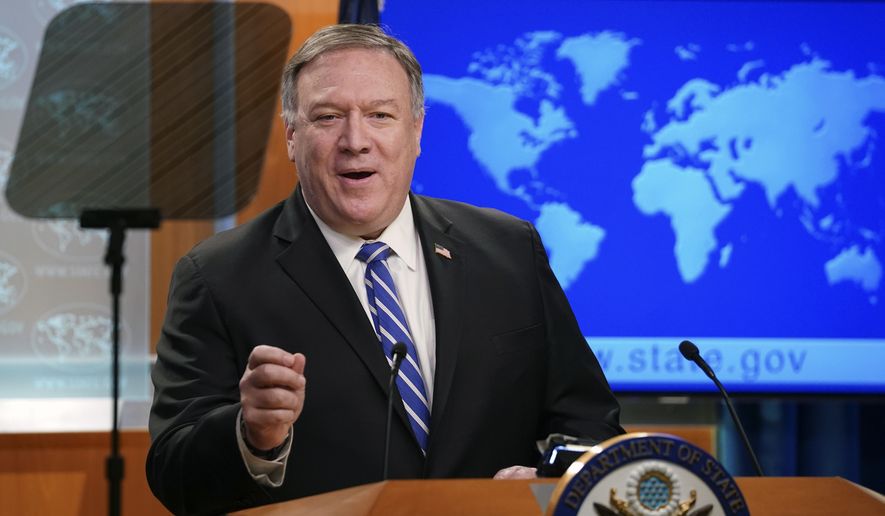Secretary of State Mike Pompeo on Wednesday called on China to provide virus samples from the coronavirus outbreak and blamed Beijing for covering up dangers posed by the disease in persecuting Wuhan doctors.
In remarks at the State Department, Mr. Pompeo also called on the international community to back Taiwan’s participation in the World Health Assembly and other United Nations organizations.
Mr. Pompeo, speaking at the State Department, called on the Chinese government to reveal what it knows about the virus outbreak that began in December, including details on “Patient Zero,” the first person infected.
“China is still refusing to share the information we need to keep people safe, such as viral isolates, clinical specimens, and details about the many Covid-19 patients in December 2019, not to mention ’patient zero,’” he said.
“Our truth-telling and calls for transparency aren’t about politics,” Mr. Pompeo added. “It’s not about bullying. It’s not about blame. It’s about the ongoing need to save American lives. This is an ongoing threat today.”
The comments were the latest salvo in a war of words between Washington and Beijing.
China has denied covering up the virus outbreak and claimed it acted appropriately.
In recent days, Chinese government spokesmen have denounced the United States and singled out Mr. Pompeo for comments criticizing China’s mishandling the outbreak.
Chinese Foreign Ministry spokeswoman Hua Chunying said in Beijing Wednesday that Mr. Pompeo should show proof the virus originated in a Wuhan laboratory.
“Mr. Pompeo cannot present any evidence because he hasn’t gotten any,” she said. “I think this matter should be handled by scientists and professionals instead of politicians.”
Chinese authorities initially said the virus began from tainted meat at a wild animal market but some have since tried to shift blame to the United States, claiming the U.S. military brought the virus to Wuhan during a military sporting event in Wuhan last October.
Mr. Pompeo has said there is strong circumstantial evidence the virus came from one of Wuhan’s research laboratories.\
“We need countries to share reliable data in a timely way – now, and the next time that a calamity like this hits. We need reliable partners,” he said.
On the World Health Organization, Mr. Pompeo said: “I also call upon WHO Director General [Tedros Ghebreyesus] to invite Taiwan to observe this month’s WHA, as he has the power to do, and as his predecessors have done on multiple occasions,” Mr. Pompeo said at the State Department.
China has sought to block rival Taiwan’s participation in U.N. organizations including the World Health Organization, a lack of participation that hindered a rapid response to the coronavirus pandemic.
Taiwan, based on travelers from Wuhan to Taiwan, learned early in the outbreak that a contagious disease was coming from Wuhan and tried to provide early warning to the WHO about the outbreak. The warnings were ignored because Taipei is not a member and the organization has been influenced by China.
China regards Taiwan, officially the Republic of China, as a breakaway province instead of an independent nation.
On the repression of Wuhan doctors, Chinese police arrested eight doctors in December for sounding the alarm on social media warning of the new type of pneumonia in Wuhan.
“It’s been 128 days since Chinese doctor Ai Fen – the director of the Wuhan Central Hospital’s emergency unit – shared information on the internet about a patient with a SARS-like virus,” Mr. Pompeo said. “Her colleague, Dr. Li Wenliang, shared Dr. Ai’s report online with medical colleagues.”
By Dec. 31, health officials in Wuhan were treating dozens of patients suffering from the disease but days later Chinese police arrested Dr. Li and the other doctors claiming they were spreading false statements on the Internet.
“China saw then that it had an emerging public health crisis on its hands. They knew. China could have prevented the deaths of hundreds of thousands of people worldwide,” Mr. Pompeo said. “China could have spared the world a descent into global economic malaise. They had a choice.”
Instead, Mr. Pompeo said the Chinese “covered up the outbreak in Wuhan.”
The China National Health Commission ordered virus samples destroyed on Jan. 3 and Chinese police “disappeared” Chinese citizens who tried to sound the alarm.
The government’s state-controlled media also targeted Chinese who called for the government and party to be transparent.
Mr. Pompeo said that as a result of China’s mishandling of the disease outbreak, many nations are beginning to understand the risk of doing business with the Chinese Communist Party.
“In recent weeks, Nigeria, Kazakhstan, and France have demarched the Chinese Communist Party ambassadors for a whole host of lies and misdeeds,” Mr. Pompeo said. Both the Australian and Swedish governments have called for an investigation of China’s handling of the outbreak.
Britain also has and the European Union are questioning their dealings with Beijing as well.
Mr. Pompeo said there is no true “win-win” relationship with a communist regime unless fair terms of trade and other relations can be established.
The secretary also said President Trump is seeking to build new ties based on greater reciprocity.
“Now countries have a chance to further insist on what’s right for their people,” Mr. Pompeo said.
On Hong Kong, Mr. Pompeo also signaled that the Trump administration is considering restricting Hong Kong’s favorable trading status based on growing mainland encroachment. A recent U.S. law requires the administration to review the trade status in light of a crackdown against pro-democracy protesters opposing new Beijing restrictions.
“Right now we are delaying our report to Congress that will assess Hong Kong’s autonomy, to allow us to account for any additional actions that Beijing may be contemplating in the run-up to the National People’s Congress that would further undermine the people of Hong Kong’s autonomy as promised by China when they entered the agreement with the people of Hong Kong,” Mr. Pompeo said.
• Bill Gertz can be reached at bgertz@washingtontimes.com.




Please read our comment policy before commenting.